|
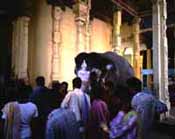 Mad, mad, Madurai is a bustling city packed with pilgrims, bullock carts and rickshaw wallahs. The
term "wallah" means “it is your trade.” I for instance am a photographer-wallah. The South of India is full of ancient temples and Madurai was to
be my first sighting of them. I had arrived in Madurai late the previous evening at the Taj Garden Retreat, perched in the hills above Madurai. The red tiled veranda looks over
the city and the terraced hotel gardens. It is a wonderful place to have a fresh lime soda (soda water, fresh lime juice and sugar syrup if desired) or a more spirited libation. Mad, mad, Madurai is a bustling city packed with pilgrims, bullock carts and rickshaw wallahs. The
term "wallah" means “it is your trade.” I for instance am a photographer-wallah. The South of India is full of ancient temples and Madurai was to
be my first sighting of them. I had arrived in Madurai late the previous evening at the Taj Garden Retreat, perched in the hills above Madurai. The red tiled veranda looks over
the city and the terraced hotel gardens. It is a wonderful place to have a fresh lime soda (soda water, fresh lime juice and sugar syrup if desired) or a more spirited libation.
I was unprepared for the sights and sounds of the morning. The Pongal Festival was in progress and the exotic sounds of the music drifted up to my hotel. 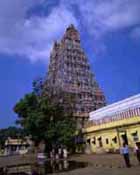 Ramesh picked me up in the morning and we left my perch above the city. As we drove down into the city, we were engulfed
in a throng of carts, rickshaws, buses and people. We all seemed to share a common destination: the Shree Meenakshi Temple. I had glimpses of the brightly
-colored temple as we wound our way through the streets. Krishna blue, green, yellow and a rainbow of colors decorated this living place of worship. Once again, I
found myself drawn into a vortex of color. As I got out of the car Ramesh asked me to leave my shoes there. I knew that I couldn't wear my shoes into the temple, but I was stubbornly
determined to keep them on as long as possible. There was no way I would consider walking the streets in my bare feet. Ever-patient Ramesh took me to
the shoe kiosk outside the temple where I left my shoes. We agreed to meet at the gate and I wandered into another world. Ramesh picked me up in the morning and we left my perch above the city. As we drove down into the city, we were engulfed
in a throng of carts, rickshaws, buses and people. We all seemed to share a common destination: the Shree Meenakshi Temple. I had glimpses of the brightly
-colored temple as we wound our way through the streets. Krishna blue, green, yellow and a rainbow of colors decorated this living place of worship. Once again, I
found myself drawn into a vortex of color. As I got out of the car Ramesh asked me to leave my shoes there. I knew that I couldn't wear my shoes into the temple, but I was stubbornly
determined to keep them on as long as possible. There was no way I would consider walking the streets in my bare feet. Ever-patient Ramesh took me to
the shoe kiosk outside the temple where I left my shoes. We agreed to meet at the gate and I wandered into another world.
My first impressions were competing with each other. The visual and the
tactile: the slippery feel of the black grimy temple stones on my feet, the incense burning in the dark recesses and the invisible insects that kept biting
my bare feet. There were brightly painted deities, temples rising endlessly into the sky and temple monkeys that made their home high above human
habitation among the painted temple deities. There were black people everywhere. Temple elephants were blessing the pilgrims with the tip of their
trunk in exchange for a few rupees. Time stood still as I explored something I could not have conceived in my wildest imaginings. I was pleasantly agog, a stranger in a strange land.
It was at this temple where so many people asked to have their photograph taken with me. My temple guide Krishnan told me that it was good luck and
that the pictures would be framed and put in their living rooms. Was I finally famous?
When I left, some hours later, Ramesh met me at the gate. We walked to the
shoe kiosk and when I didn't have the correct coinage in rupees, to his horror I overpaid. From that time on, whenever we stopped at a vendor he would
insist upon paying or I would have to assure him that I had the correct change. I found myself in a dilemma at the kiosk. What to do with these grimy feet
and my clean shoes? I ended up walking back to the car in bare feet and from then on my shoes stayed in the car.
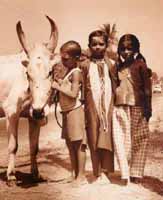 Driving through the country is not what you would expect. Everywhere you go there are people. In the
more rural areas most of them are walking. Many have bullock carts. Cars often travel at night without their headlights on. They are constantly honking to
warn people and animals of their presence. Cows, dogs and other livestock lie about on the side of the road. Often they are in the roadway but amazingly
escape any harm. Once, while driving, our car became engulfed in gasoline fumes. Ramesh knew exactly what the problem was. We pulled off the side of the road and he got
out a new seal. While I alternately looked under the car at the leaking gasoline and the impending convergence of young men from the surrounding fields, he
replaced the seal. Before we could be surrounded by a mass of curious onlookers, we were back on our way. Driving through the country is not what you would expect. Everywhere you go there are people. In the
more rural areas most of them are walking. Many have bullock carts. Cars often travel at night without their headlights on. They are constantly honking to
warn people and animals of their presence. Cows, dogs and other livestock lie about on the side of the road. Often they are in the roadway but amazingly
escape any harm. Once, while driving, our car became engulfed in gasoline fumes. Ramesh knew exactly what the problem was. We pulled off the side of the road and he got
out a new seal. While I alternately looked under the car at the leaking gasoline and the impending convergence of young men from the surrounding fields, he
replaced the seal. Before we could be surrounded by a mass of curious onlookers, we were back on our way.
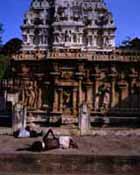 Rajgopal, my guide at the Srirangam Temple in Trichy, spoke excellent English he says he learned from television
and tourists. He offered to carry my backpack and in so doing transgressed the boundaries of propriety. There are many layers of what is acceptable. Jobs are very
rigidly defined by caste tradition. I learned this very quickly when Ramesh very tactfully but firmly returned the bag I had asked him to carry. I soon came to realize
that when someone was willing to transgress their boundaries for you it was inevitable they would ask you to transgress yours. Rajgopal Rajgopal, my guide at the Srirangam Temple in Trichy, spoke excellent English he says he learned from television
and tourists. He offered to carry my backpack and in so doing transgressed the boundaries of propriety. There are many layers of what is acceptable. Jobs are very
rigidly defined by caste tradition. I learned this very quickly when Ramesh very tactfully but firmly returned the bag I had asked him to carry. I soon came to realize
that when someone was willing to transgress their boundaries for you it was inevitable they would ask you to transgress yours. Rajgopal 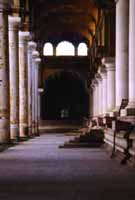 took me to see the erotic art at the temple. At the banks of the
Cauvery River, the Ganges of the South, he told me his sad lament about the "untrustworthiness" of Indian girls and, upon parting, gave me his "card." I was left with the
impression that he may be the one who is unchaste. took me to see the erotic art at the temple. At the banks of the
Cauvery River, the Ganges of the South, he told me his sad lament about the "untrustworthiness" of Indian girls and, upon parting, gave me his "card." I was left with the
impression that he may be the one who is unchaste.
After Srirangam I felt "temple weary." We headed on towards Tanjore, with a reluctant detour to the Darasuram
temple. All along the roads in the South women had piles of rice grass laying in the path of the cars. I was shocked when we ran over it the first time. Ramesh explained that
this is how the rice is separated from its hull.
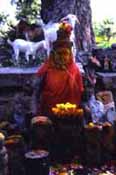 To me, Darasuram is the most beautiful temple of all. It is mostly denuded of its brightly colored painting, but that only
serves to accentuate the delicate and intricate carvings on the black basalt stone. The craftsmanship reminded me of Egyptian carvings I had seen from the tombs of the pharaohs
. The diffuse sunlight filtering through the columns was an epiphany of time arrested. The day I was there was the celebration of the virgin. Beautifully dressed young girls
were celebrating with an outing to the temple. To me, Darasuram is the most beautiful temple of all. It is mostly denuded of its brightly colored painting, but that only
serves to accentuate the delicate and intricate carvings on the black basalt stone. The craftsmanship reminded me of Egyptian carvings I had seen from the tombs of the pharaohs
. The diffuse sunlight filtering through the columns was an epiphany of time arrested. The day I was there was the celebration of the virgin. Beautifully dressed young girls
were celebrating with an outing to the temple.
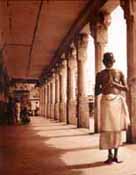 On our drive to Pondicherry I remember the Coca-Cola stand that looked as if it were many cardboard boxes
pasted together, the whole of the building emblazoned over and over again with the red and white Coca-Cola logo. They had no Coca-Cola, apparently because of
some disagreement Coca-Cola and the Indian government had over the secrecy of the ingredients in their recipe. Pepsi is now sold at the Coca-Cola shops. On our drive to Pondicherry I remember the Coca-Cola stand that looked as if it were many cardboard boxes
pasted together, the whole of the building emblazoned over and over again with the red and white Coca-Cola logo. They had no Coca-Cola, apparently because of
some disagreement Coca-Cola and the Indian government had over the secrecy of the ingredients in their recipe. Pepsi is now sold at the Coca-Cola shops.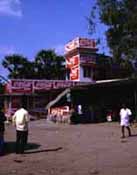
Bathrooms were always a novelty. Toilets were to be found in hotels and restaurants in the city and many
tourist spots. Turkish toilets (squatty potties), a hole in the ground with two footrests, were fairly common in homes, airports and other public venues. In smaller
towns and further off the beaten path a bathroom could be a gate that closes while you have privacy to pee in the gutter. As a certain shoe company is so fond of saying, "just do it."
|